国际学术会议常用语英语.docx
英语国际会议交流用语

英语国际会议交流用语以下是一些常用的英语国际会议交流用语:1. Opening remarks/Welcome address:- Ladies and gentlemen, welcome to [conference name].- It is an honor to address you all at this prestigious conference.- I would like to extend a warm welcome to all the participants.2. Introducing oneself/Introducing a speaker:- My name is [name], and I am the [position] of[company/organization].- It is my pleasure to introduce our next speaker, [name].3. Presenting the agenda:- Let's move on to the first item on the agenda.- The agenda for today's conference includes several important topics.- We will be discussing [topic] in the first session.4. Giving a presentation:- I would like to share some key findings from our recent research. - This presentation aims to provide an overview of our company's achievements.- I will be talking about the challenges and opportunities in the [industry/field].5. Asking for clarification/Seeking further information:- Could you please clarify your point about [topic]?- I would appreciate more details about [aspect of the presentation].- Can you provide some examples to support your argument?6. Offering opinions/Contributing to the discussion:- In my opinion, it is crucial to prioritize sustainability in our business practices.- I believe that the proposed strategy will lead to significant growth. - I would like to suggest an alternative approach to solve the problem.7. Agreeing/disagreeing:- I fully agree with the point made by the previous speaker.- I respectfully disagree with the assertion that [statement].- While I understand the argument, I think we should consider other factors.8. Summarizing/Concluding:- In summary, today's discussions have highlighted the need for collaboration.- To conclude, we have identified several action points to address the challenges.- I would like to thank all the participants for their valuable contributions.9. Closing remarks:- It has been a fruitful and engaging conference, and I hope you have found it beneficial.- I would like to express my gratitude to the organizing committee and everyone involved.- We look forward to meeting you again at the next conference.这些用语可以帮助您在国际会议上流利地交流和参与讨论。
最新国际学术会议常用语(英语)
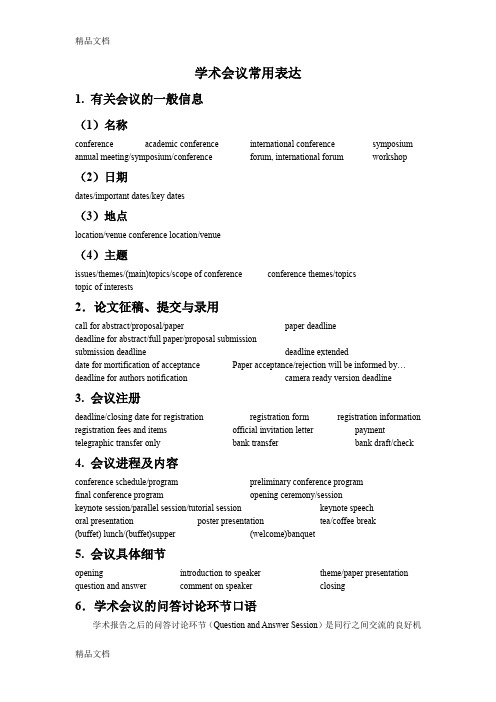
学术会议常用表达1. 有关会议的一般信息(1)名称conference academic conference international conference symposium annual meeting/symposium/conference forum, international forum workshop(2)日期dates/important dates/key dates(3)地点location/venue conference location/venue(4)主题issues/themes/(main)topics/scope of conference conference themes/topicstopic of interests2.论文征稿、提交与录用call for abstract/proposal/paper paper deadlinedeadline for abstract/full paper/proposal submissionsubmission deadline deadline extendeddate for mortification of acceptance Paper acceptance/rejection will be informed by…deadline for authors notification camera ready version deadline3. 会议注册deadline/closing date for registration registration form registration information registration fees and items official invitation letter payment telegraphic transfer only bank transfer bank draft/check4. 会议进程及内容conference schedule/program preliminary conference programfinal conference program opening ceremony/sessionkeynote session/parallel session/tutorial session keynote speechoral presentation poster presentation tea/coffee break (buffet) lunch/(buffet)supper (welcome)banquet5. 会议具体细节opening introduction to speaker theme/paper presentation question and answer comment on speaker closing6.学术会议的问答讨论环节口语学术报告之后的问答讨论环节(Question and Answer Session)是同行之间交流的良好机会,双方可以针对报告中的具体问题进行探讨(1)答问的方式与技巧回答讨论环节可以让报告人通过互动及时地获得信息反馈并可以把在讨论中或得的建设性建议用于下一步的工作,因此对科研工作有很大的促进作用。
国际学术会议常用语(英语)

学术会议常用表达1. 有关会议的一般信息(1)名称conference academic conference international conference symposium annual meeting/symposium/conference forum, international forum workshop(2)日期dates/important dates/key dates(3)地点location/venue conference location/venue(4)主题issues/themes/(main)topics/scope of conference conference themes/topicstopic of interests2.论文征稿、提交与录用call for abstract/proposal/paper paper deadlinedeadline for abstract/full paper/proposal submissionsubmission deadline deadline extendeddate for mortification of acceptance Paper acceptance/rejection will be informed by…deadline for authors notification camera ready version deadline3. 会议注册deadline/closing date for registration registration form registration information registration fees and items official invitation letter payment telegraphic transfer only bank transfer bank draft/check4. 会议进程及内容conference schedule/program preliminary conference programfinal conference program opening ceremony/sessionkeynote session/parallel session/tutorial session keynote speechoral presentation poster presentation tea/coffee break (buffet) lunch/(buffet)supper(welcome)banquet5. 会议具体细节opening introduction to speaker theme/paper presentation question and answer comment on speaker closing6.学术会议的问答讨论环节口语学术报告之后的问答讨论环节(Question and Answer Session)是同行之间交流的良好机会,双方可以针对报告中的具体问题进行探讨(1)答问的方式与技巧回答讨论环节可以让报告人通过互动及时地获得信息反馈并可以把在讨论中或得的建设性建议用于下一步的工作,因此对科研工作有很大的促进作用。
国际学术交流英语单词词汇
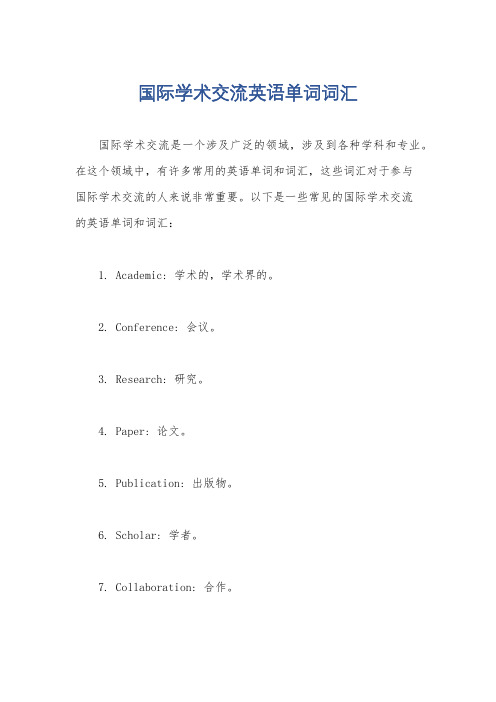
国际学术交流英语单词词汇国际学术交流是一个涉及广泛的领域,涉及到各种学科和专业。
在这个领域中,有许多常用的英语单词和词汇,这些词汇对于参与国际学术交流的人来说非常重要。
以下是一些常见的国际学术交流的英语单词和词汇:1. Academic: 学术的,学术界的。
2. Conference: 会议。
3. Research: 研究。
4. Paper: 论文。
5. Publication: 出版物。
6. Scholar: 学者。
7. Collaboration: 合作。
8. Presentation: 演讲,展示。
9. Abstract: 摘要。
10. Peer review: 同行评议。
11. Citation: 引用。
12. Thesis: 论文,论题。
13. Dissertation: 学位论文。
14. Plagiarism: 抄袭。
15. Academic integrity: 学术诚信。
16. Grant: 资助金,补助金。
17. Symposium: 座谈会,研讨会。
18. Panel: 小组讨论。
19. Academic journal: 学术期刊。
20. Academic writing: 学术写作。
这些词汇涵盖了国际学术交流中的各个方面,包括会议、研究、出版、合作等。
在国际学术交流中,熟悉并正确运用这些词汇是非常重要的,可以帮助人们更好地参与到国际学术交流中去。
同时,这些词汇也反映了国际学术交流的复杂性和多样性,需要人们具备丰富的词汇量和专业知识才能更好地融入这个领域。
希望以上信息对你有所帮助。
国际会议英语口语100句-2010年1月7日(word文档良心出品)
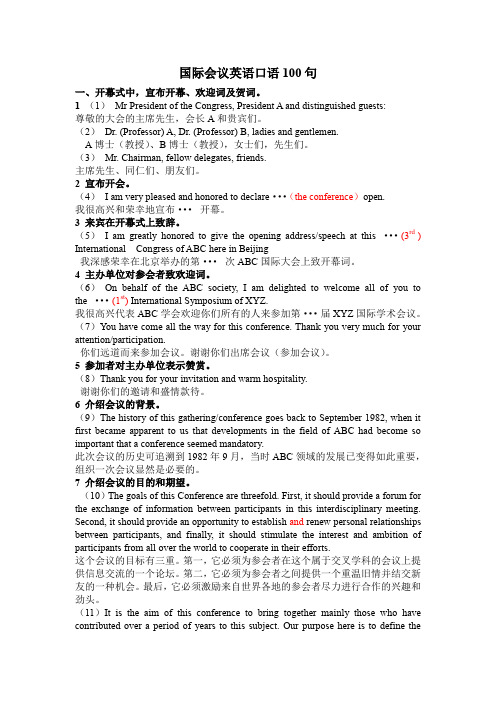
国际会议英语口语100句一、开幕式中,宣布开幕、欢迎词及贺词。
1 (1)Mr President of the Congress, President A and distinguished guests:尊敬的大会的主席先生,会长A和贵宾们。
(2)Dr. (Professor) A, Dr. (Professor) B, ladies and gentlemen.A博士(教授)、B博士(教授),女士们,先生们。
(3)Mr. Chairman, fellow delegates, friends.主席先生、同仁们、朋友们。
2 宣布开会。
(4)I am very pleased and honored to declare···(the conference)open.我很高兴和荣幸地宣布···开幕。
3 来宾在开幕式上致辞。
(5)I am greatly honored to give the opening address/speech at this ···(3rd ) International Congress of ABC here in Beijing我深感荣幸在北京举办的第···次ABC国际大会上致开幕词。
4 主办单位对参会者致欢迎词。
(6)On behalf of the ABC society, I am delighted to welcome all of you to the ···(1st) International Symposium of XYZ.我很高兴代表ABC学会欢迎你们所有的人来参加第···届XYZ国际学术会议。
(7)You have come all the way for this conference. Thank you very much for your attention/participation.你们远道而来参加会议。
国际学术会议常用语英语

国际学术会议常用语英语This model paper was revised by LINDA on December 15, 2012.学术会议常用表达1. 有关会议的一般信息(1)名称conference academic conference international conference symposiumannual meeting/symposium/conference forum, international forum workshop(2)日期dates/important dates/key dates(3)地点location/venue conference location/venue(4)主题issues/themes/(main)topics/scope of conference conference themes/topics topic of interests2.论文征稿、提交与录用call for abstract/proposal/paper paper deadlinedeadline for abstract/full paper/proposal submissionsubmission deadline deadline extendeddate for mortification of acceptance Paper acceptance/rejectionwill be informed by…deadline for authors notification camera ready version deadline3. 会议注册deadline/closing date for registration registration form registration informationregistration fees and items official invitation letter paymenttelegraphic transfer only bank transferbank draft/check4. 会议进程及内容conference schedule/program preliminary conference programfinal conference program opening ceremony/session keynote session/parallel session/tutorial sessionkeynote speechoral presentation poster presentationtea/coffee break(buffet) lunch/(buffet)supper (welcome)banquet5. 会议具体细节opening introduction to speakertheme/paper presentationquestion and answer comment on speakerclosing6.学术会议的问答讨论环节口语学术报告之后的问答讨论环节(Question and Answer Session)是同行之间交流的良好机会,双方可以针对报告中的具体问题进行探讨(1)答问的方式与技巧回答讨论环节可以让报告人通过互动及时地获得信息反馈并可以把在讨论中或得的建设性建议用于下一步的工作,因此对科研工作有很大的促进作用。
国际学术会议常用语(英语)
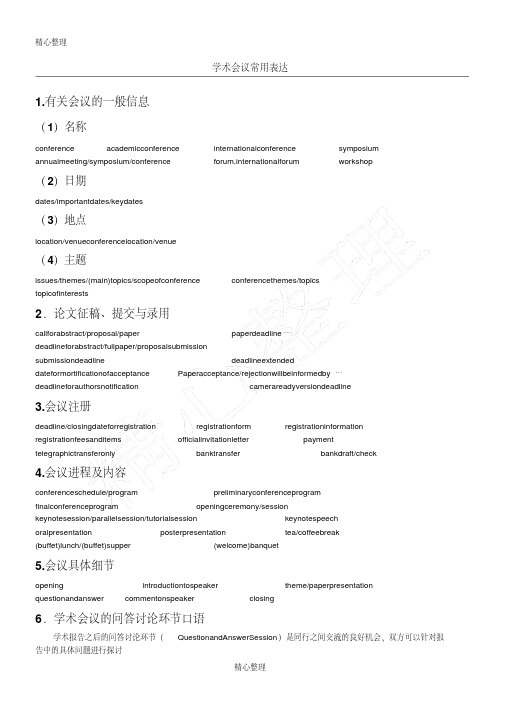
④问题的类型
对于寻求具体解释的一些问题, 可以简单地重复报告的内容来对问题进行说明或证明,
或是澄清听众的误解。 如
果提问者对报告内容提出不同见解,可以通过资料、事实、数据等来证明自己的观点,但一定注意态度要礼貌谦
和。 对于过于复杂的深层问题无法进行简单回答时, 可以在简略回答之后邀约提问者在其他时间进行讨论。
准备作为准备工作的一部分,进行深入考虑,全面的预测听众可能提出的问题,可以假设一些问题,并准备好最
合适的解答。如果会议没有统一安排每个报告的问答环节,报告者在进行报告时就要预先告知听众随后的
Q&
ASession,这样可以让听众为提问做好准备。
②过程控制
在时间允许的情况下尽可能让每个想提问的人都有机会提问,
③答问方式
应首先仔细听清问题, 在回答之前应将问题清楚的重复一遍, 这可以保证对问题的正确理解, 确保每个人都能听 清楚问题,同时给自己一些时间来思考,表述答案前可做片刻停留,这既引起了听众的注意,又表明了对答案的 谨慎态度, 同时也给自己留更多的思考空间。 不要对问题进行评价, 避免说类似 “ Thatwasagreatquestion”的话, 如果想要对某一问题进行肯定,可以用“ Thanksforaskingthatquestion ”或“ Igetaskedthatquestionbymanypeople. ” 等中性的表述,还可以让听众感到平等。回答问题时应尽可能简洁,切题。在回答中应尽可能多地提及报告中的 内容,这有利于听众对报告内容加深印象,并有利于控制问答环节的主题。
精心整理
学术会议常用表达
1.有关会议的一般信息
( 1)名称
conference
academicconference
英文学术会议演讲用语指南
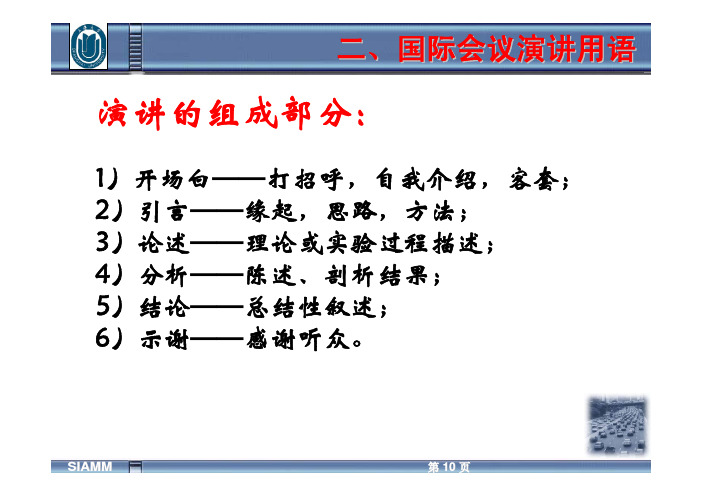
演讲的组成部分:1)开场白——打招呼,自我介绍,客套;2)引言——缘起,思路,方法;3)论述——理论或实验过程描述;4)分析——陈述、剖析结果;5)结论——总结性叙述;6)示谢——感谢听众。
1)开场白招呼用语:Mr. Chairman, Ladies and Gentlemen Mr. Chairman, Distinguished Colleagues, Ladies and GentlemenProf. A, Ladies and GentlemenGood morning, everyoneGood afternoon, everyone1)开场白感谢主席或自我介绍:Thank you very much, Professor A, for your kind introduction.Thank you, Mr. Chairman, for your gracious introduction.My name is B, from C. The title of my presentation is D.I am B from C. The topic of my paper is (about) D.1)开场白社交辞令:I am delighted[honored, privileged, proud, happy, …] to be here (with you this morning).I am honored to have the chance to address you on this special occasion.It’s a great pleasure for me to be here.I appreciate the opportunity to be here to attend this mini-symposium[session].1)开场白勾画轮廓(显示提纲、目录):I am going to give this talk in four parts. First…, Second…, Third…, Finally…The outline of my talk is as follows.My presentation will be divided into the following three parts.I would like to divide my talk into three parts: 1)background of …; 2) recent results and analysis; 3)conclusions.2)引言点明主题:Today I would like to talk to you about some of our work in the field of…1.[to give a talk on…];2.[to devote this talkto…] ; 3.[to present the results of…]; 4.[to provide a brief overview of the majorfindings in this area. After that, I want todescribe some of our recent results on... ];5.[to have an overview picture of our recentwork on…].2)引言点明主题:My discussion today on XXX will try to summarize its complex nature and to present some of our new findings.My point this morning will be to illustrate …My purpose today is to make a general comment on recent progress in study of …and to give some new results on...2)引言点明主题:My topic today will deal with one of the most serious problems we are facing… The paper I’m going to present today will describe some of the important aspects in this area.It is my intention this afternoon to summarize some recent advances in …and what’s going on at…[in…].2)引言阐释背景:The motivation of this work is like this. XXX has found its wide application in various fields of science and technology.I think it would be best to start out by making some general comments on previous work in this area.I would like to preface my remarks with a brief description of advances in…2)引言阐释背景:To begin with, we have to consider the recent progress in this field.I want to make some comments on the topic. First, briefly review some basic concepts. Second, describe the state-of-the-art development of the subject. The last comment relates to the open problems in this area.2)引言说明思路:The basic idea in our work can be elucidated as follows.Based on previous work, we developed a new technique[method, algorithm, experimental device, numerical model…]in[for]…To obtain meaningful results, we constructed[established, put forward] a physical[mathematical] model with…2)引言说明思路:To give the analytical[numerical] results, we make the following assumptions[hypotheses] and use the methods [t heorems] of…The main procedure of experiments [computations, derivation, deduction…] could be described as follows.2)引言简介结果:With the above-mentioned methods, we have the following new findings.Simulated results shows a fairly good agreement with experimental data.The numerical results verified the effectiveness of the presented model.3)论述展开论述:Now I will give the mathematical formulation of the studied problem.The sketch of the configuration is like this.The governing equations[boundary conditions, initial conditions,…] are… I’d like to give a brief description of the mathematical model we established.3)论述展开论述:Now I will give a simple introduction to the experimental set-up.The system consists of three parts…Experiments were conducted at XXX. The main procedure of experiments is as follows.We have paid special attention to data processing…3)论述详细描述:Let me make two remarks in detail. First of all, I’d like to describe the experimental [theoretical, numerical…] methods. The second remark is its application to the studied problem.I’d like to go into some detail on this question.Let us consider some of these factors in more detail.3)论述详细描述:We will discuss this matter in a little detail as we go on.Since this problem is very important to us. I’d like to spend some time describing it in greater detail.I’d like to discuss this issue at length. I’d like to address myself to the most important aspects of the treatment…3)论述简略描述:In the interest of time,[In the interest of brevity, For the sake of time, Because of the time limitation,…]I won’t go into details on this subject[I won’t enter into details on this topic].I don’t feel that I should spend too much time giving the detail of…I’d like to offer s short description of…3)论述简略描述:I’d just like to go through these various issues rapidly.Due to the limitation of the schedule, I will consider these interesting points very briefly.Let’s go over these points very quickly. Let me touch on this topic briefly.There is one more issue I’d like to touch upon.4)分析结果陈述(借助于图表、公式):Through the above analysis[simulation, experiment], we have the following results[findings].We show the simulation [numerical, theoretical, experimental] results in the figures…[ lists…].We give the comparison between numerical and experimental results in Figure 1.4)分析结果陈述:The relation between A and B is presented here.With these figures, we exhibit the dependence of A on B.From this figure we can clearly see the effects of A on B.From the above deduction, we have the main theorem in this study.4)分析结果分析:From these figures, we can see that the obtained numerical results agree well with[are in good agreement with, accords with, are consistent with]the experimental data.From these curves, we can conclude [reach the conclusion] that with increasing A, B decreases.4)分析结果分析:From this figure we find some discrepancies between theory and experiments, which might come from… With these results, we witness the crucial role played by multiple scales. We have confirmed the tendency of the variation of A observed in previous experiments.5)结论结论陈述:I would like to conclude with a few of remarks on this problem.Allow me to conclude by listing the following points.Let me conclude by making an observation concerning…In conclusion, I would like to indicate the following points.5)结论结论陈述:I would like to close by saying that…In closing, I would like to comment on the application of this theory.I would like to close my speech by a few words.Now, I’d like to sum up the results of this investigation.To summarize my talk, the presented model is realistic and effective in use.5)结论展望未来:Finally, I must say a few words about the perspective of the studied issue. XXX is still an open problem.The problem on XXX is needed to be solved in future study.The method presented here could be generalized to the case…6)示谢感谢听众:Thank you for your attention [endurance, patience,…].I want to thank you for your attention [endurance, patience,…].Once again I would like to thank you for the opportunity of talking to you on the subject.起转承合的技巧(1)转移话题:The next point I’d like to bring up has to do with…We’ll move on to the next problem of this topic.Now let me turn to another question. Turning to the other question, I’d like to talk about the time evolution of the variable.起转承合的技巧(1)转移话题:I’d like to shift to another issue.I’d like to turn our attention now to the next problem.Let us move on to another problem.I shall now switch over to the subject of…Time brings me to my second point.Now, let’s look at the other side of the coin.起转承合的技巧(2)转回主题:I’d like to return to our main objective [question; original issue].Let’s get back to what we consider important.I’d like to refer again to the problem mentioned at the beginning.This brings me back to the question raised at the beginning of my talk.起转承合的技巧(3)预告重点:I am going to say much more about the intrinsic mechanism for the phenomenon. I’ll restrict myself to the results of our observation on…I’d like to confine myself to one particular facet of these.I’ll spend a few minutes revealing the truth behind the phenomena.起转承合的技巧(4)反复强调:This is the only way, and I repeat “the only way”to get correct results.I believe that my opinions present a viewpoint which may be reasonable and which may be valuable.It is this factor that influences the whole process.Only in this fashion can we reach the conclusion…起转承合的技巧(5)平滑过渡:适当利用短语实现顺滑驳接: 例证:for example, for instance, to illustrate, more specifically比照:similarly, in the same way, in contrast, on the contrary, in spite of 附加:in addition, what’s more结果:as a result, consequently理由:for this purpose, on account of谢谢关注!。
- 1、下载文档前请自行甄别文档内容的完整性,平台不提供额外的编辑、内容补充、找答案等附加服务。
- 2、"仅部分预览"的文档,不可在线预览部分如存在完整性等问题,可反馈申请退款(可完整预览的文档不适用该条件!)。
- 3、如文档侵犯您的权益,请联系客服反馈,我们会尽快为您处理(人工客服工作时间:9:00-18:30)。
学术会议常用表达1.有关会议的一般信息( 1)名称conference academic conference international conferencesymposiumannual meeting/symposium/conference forum, international forum workshop( 2)日期dates/important dates/key dates( 3)地点location/venue conference location/venue( 4)主题issues/themes/(main)topics/scope of conference conference themes/topics topic of interests2.论文征稿、提交与录用call for abstract/proposal/paper paper deadlinedeadline for abstract/full paper/proposal submissionsubmission deadlinedate for mortification of acceptancedeadline extendedPaper acceptance/rejection will beinformed by⋯deadline for authors notification camera ready version deadline3.会注册deadline/closing date for registrationregistration informationregistration formregistration fees and itemspaymentofficial invitation lettertelegraphic transfer only bank transfer bank draft/check4.会程及内容conference schedule/program preliminary conference programfinal conference program opening ceremony/sessionkeynote session/parallel session/tutorial session keynotespeechoral presentation poster presentation tea/coffee break (buffet) lunch/(buffet)supper(welcome)banquet5.会议具体细节opening introduction to speaker theme/paper presentationquestion and answer comment on speaker closing6.学术会议的问答讨论环节口语学术报告之后的问答讨论环节(Question and Answer Session)是同行之间交流的良好机会,双方可以针对报告中的具体问题进行探讨( 1)答问的方式与技巧回答讨论环节可以让报告人通过互动及时地获得信息反馈并可以把在讨论中或得的建设性建议用于下一步的工作,因此对科研工作有很大的促进作用。
对于如此重要的环节,报告人在报告之前应进行必要的准备,尽可能地保证这一环节完整、流畅地进行,一般应注意以下几点。
① 准备工作学术报告中的提问者往往是相关领域中的专家,对报告的内容非常熟悉,因此所提出的问题可能会有相当的深度、广度以及不可预见性,有时甚至直接指出研究工作中的不完善之处或漏洞所在。
由于时间关系,回答者在现场一般没有充分的时间进行考虑,这就要求报告人要事先进行充分的准备。
在报告前,报告人应将对答环节的准备作为准备工作的一部分,进行深入考虑,全面的预测听众可能提出的问题,可以假设一些问题,并准备好最合适的解答。
如果会议没有统一安排每个报告的问答环节,报告者在进行报告时就要预先告知听众随后的Q&A Session ,这样可以让听众为提问做好准备。
② 过程控制在时间允许的情况下尽可能让每个想提问的人都有机会提问,不要让少数提问者的提问占据整个讨论环节,应按照提问者举手示意的顺序来请出提问者。
在开始回答问题时,首先与提问者目光接触,然后转向其他所有听众,这样可以获得所有听众的注意。
在回答完毕之后,可以再次通过目光了解提问者是否对回答表示满意。
报告人应控制整个讨论的过程,对于与主题无关的问题可以礼貌地回避。
③ 答问方式应首先仔细听清问题,在回答之前应将问题清楚的重复一遍,这可以保证对问题的正确理解,确保每个人都能听清楚问题,同时给自己一些时间来思考,表述答案前可做片刻停留,这既引起了听众的注意,又表明了对答案的谨慎态度,同时也给自己留更多的思考空间。
不要对问题进行评价,避免说类似“That was a great question”的话,如果想要对某一问题进行肯定,可以用“Thanks for asking that question ”或“ I get asked that”等中性的表述,还可以让听众感到平等。
回答问题时应尽可question by many people.能简洁,切题。
在回答中应尽可能多地提及报告中的内容,这有利于听众对报告内容加深印象,并有利于控制问答环节的主题。
④ 问题的类型对于寻求具体解释的一些问题,可以简单地重复报告的内容来对问题进行说明或证明,或是澄清听众的误解。
如果提问者对报告内容提出不同见解,可以通过资料、事实、数据等来证明自己的观点,但一定注意态度要礼貌谦和。
对于过于复杂的深层问题无法进行简单回答时,可以在简略回答之后邀约提问者在其他时间进行讨论。
对于听众的评价或是建议应表示感谢,但要控制时间,适时地打断发言人并转入下一个问题。
对不知道答案的问题应坦率的承认,不要回避或转换话题,并尽可能提供相关的书籍,资料或是该方面的专家以供参考。
⑤ 时间的把握为了能够巧妙地结束回答问题环节,可事先准备一段总结性的陈述用来重申报告主题并结束问答环节。
注意在达到规定时间时应立刻结束讨论环节,在回答最后一个问题之前们就要礼貌地表示即将超时,并可以让其他提问者将问题留在会后进行讨论。
⑥ 提问者的礼仪大型会议中回答环节的时间往往比较短暂,提问者应抓住机会参与讨论,同时应注意以下方面。
如果为提问者准备了麦克风,则应在拿到麦克风后等待阿加安静下来在进行提问;大声地表述,让提问者和听众都能够听清楚问题;不必解释提问的理由以免浪费时间,但如果适宜可以需要地介绍自己(一定要简要);对所提的问题应做好准备,以保证问题的有效性(不要提那些答案而易的)提必短;每次尽量只提一个,把更多的机会留其他听众。
(2)常用表达① 提I would like to ask/address/raise a question about⋯I would like to know(whether)⋯I would be glad to know(whether)⋯I have a question about⋯May I ask (a question about)⋯?My question is/concerns//is concerned with⋯What I would like to ask is⋯What I am asking is⋯I wonder if you would like to explain/comment on the point of⋯I would be grateful/appreciate/obliged/for(to have) some explanation about⋯I wonder if you would be kind enough to explain/comment on/give some example for ⋯I wonder (What I am wondering is)⋯I am curious about/interested in/keen on(whether/why/how/what/when)⋯? Could you please tell me whether/why/how/what/when⋯?Do you mind showing me whether/why/how/what/when⋯?I could not understand what you really mean by⋯Do you have any ideas about⋯?What do you think of/about⋯?Could you back ⋯ up?Could you give us an example about⋯?Could you provide any example to prove what you have said about⋯? Could you give any example that shows⋯?② 回答a.行确Are you asking me the question about⋯?I am not quite about the question? Do you mean⋯?I am not quite sure what your question is. Could you address your question more specifically?What do you mean by ⋯?I don ’ t known whether I have understood your question correctly. Do you mean⋯.?b.肯定会否定的表示Yes. /I do.⋯The answer is (not) correct/true/rightExactly!Precisely!I think so.I think you’ re right.I don ’t think so.That is just what I mean.That is not what I mean.I (don ’ t) believe/consider/suppose/regard the viewpoint is true.Sure. /Absolutely. /Certainly. /Definitely.No, (absolutely/certainly/definitely) not.I ’m in complete agreement.I (quite) agree.I couldn’t agree more.c.正面回答My answer(to the question) is⋯To answer this question, I would like to say that⋯The direct/simple/brief answer to the question is⋯Let me answer your question by same examples of⋯I ’d like to make a few comments on/explanation about⋯I think I can give you a few general comments on/explanation about⋯To comment on the question of you, I have made comparison between⋯and⋯I ’d like to present/offer/give/express/state my opinion on⋯In my opinion, the conclusion can be supported by the experimental result that⋯To answer your question, I’ d like to repeat what I said just know.I think this picture will be helpful for your understanding.Here, I’d like to explain it briefly.My idea is on the basis of two points. The first is⋯, and the second is⋯I will explain by some examples.d.非正面回答Now I can only present same estimation about that⋯As far as I know, little in-depth research has bean carried out yet.I can only provide/I have only a partial answer to that question.That ’s one possible explanation, but not the only one.I ’m afraid it’s a bit difficult for me to present some experimental data atthe moment to support the theory since my idea is mainly out of theoretical consideration.I ’m afraid the question is too complicated to be answered with a few words.I ’d like to discuss it with you after the session.I think the answer to the question needs some further study.I ’m afraid is not within the field of the presentation.I ’m not sure if what you’re saying has any relevance here.I ’m not sure if what you’re saying has anything to do with our problem.I ’m not sure if what you’re saying really matters in this case.I ’m not sure if what you’re saying is relevant to our problem.e.无法回答时的表述I ’ m sorry my experience/knowledge about your question is very limited so Ithink I cannot give a good answer to your question.I ’ m sorry I really don’t know the answer to the question.Unfortunately I cannot answer the question at the moment.I ’ m afraid I have no idea how to answer your question (about that).Sorry, I’m afraid I know little about that matter, so I don’t think I can answer your question right now.It ’s quite difficult for me to answer that question now.I can ’t really recall; I’ll have to get back to you on that.I can ’t quite remember; I’ll need to do a little checking and get back toyou.I can ’t fully remember; I’ll have to check up on it.I can ’t recall all the facts; I’ll have to get back to you.f.回答之后的表述I wonder whether my question is helpful to you.Does that answer your question in a right way?Is my explanation clear enough?Is that what you wanted me to answer?Would anyone like to and anything (to what’ve said)?I Would anyone care to comment?Would anyone like to give their ideas on this?Would anyone care to add their thoughts(to the discussion)?。
